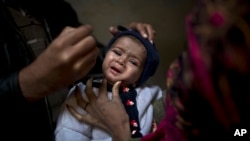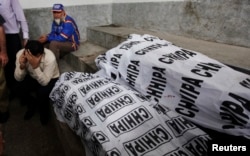WASHINGTON —
The war on polio is in danger of being lost in Pakistan, and in a dramatic development a new strain of polio has been identified in a part of the country where eradication efforts against the crippling disease are most at risk because of attacks against vaccinators.
Pakistan is one of only three countries, along with Afghanistan and Nigeria where polio remains endemic and while eradication efforts are making progress in Afghanistan and Nigeria they are faltering in Pakistan, the only country in the world where polio case rose from 2012 to 2013.
Dr. Sarfraz Khan Afridi, a WHO official based in Peshawar, the capital city of Pakistan’s restive Khyber Pakhtunkhaw province in the northwest of the country, told VOA’s Deewa Radio that 91 cases of polio were reported in 2013, up from 58 in 2012.
Earlier this month, the WHO warned that Peshawar has the world’s largest reservoir of polio virus and that 90 percent of Pakistani polio cases last year were linked to a strain of the disease found in Peshawar’s sewers. The WHO researchers say that 90 percent of the polio cases in Pakistan can be traced back to the highly contagious strain found in Peshawar, and unless transmissions are curbed in Peshawar, the virus could spread, threatening global eradication efforts.
Dr. Kaleemullah Khan who is the deputy head of the Khyber Pakhtunkhaw government’s polio eradication program, also talking to Deewa Radio said if urgent steps were not taken, the polio virus will “soon be known as Pashtun virus,” after the people who live in Pakistan’s northwest regions and Afghanistan.
Polio eradication efforts cost $1 billion a year and few public health campaigns have been as successful. Twenty-five years ago about 350,000 people, mostly children were crippled by polio every year. Now, only about 250 people are infected, but that number could rise dramatically because of attacks against polio vaccinators in Pakistan by Islamist Taliban militants.
Islamist militants have attacked polio vaccinators in other countries, such as Nigeria, claiming the vaccinators are spies or part of drive to sterilize Muslims or spread HIV.
But nowhere has the violence against vaccinators reached the level found in Pakistan. There are almost daily attacks against vaccinators and violence is escalating. Recently a bomb targeting a polio security team killed six policemen and a young boy about 30 kilometers outside Peshawar. Last year there were more than 30 attacks against vaccinators.
Observers say polio eradication efforts in Pakistan suffered a setback after Pakistani’s learned that the CIA had paid a Pakistani doctor, Shakil Afridi to conduct a vaccination campaign in Abbottabad, in a bid to get DNA samples from children inside the compound that housed a-Qaida leader, Osama bin Laden.
Vaccinators who mark houses with chalk to distinguish them from non-vaccinated homes had already come under suspicion in a region targeted by drone strikes and news of the fake vaccination campaign in Abbottabad raised more suspicions about their efforts.
There was widespread outrage over the case in the polio eradication community. InterAction, a coalition of about 200 U.S. non-governmental organizations said the Abbottabad incident had jeopardized the whole eradication effort.
"The CIA's use of the cover of humanitarian activity for this purpose casts doubt on the intentions and integrity of all humanitarian actors in Pakistan, thereby undermining the international humanitarian community's efforts to eradicate polio," InterAction wrote.
Pakistani officials insist they are working to mitigate threat risks to vaccinators.
Talking to VOA’s Urdu Service, Ayesha Raza Farooq, Prime Minister’s Nawaz Sharif’s personal representative for polio eradication said the government is trying to provide foolproof security to the teams that administer polio vaccines.
“We are in the process of finalizing an emergency action plan for 2014,” but she says that constant attacks on polio workers and on security forces escorting them pose “a great challenge for the government.”
Cricketer turned politician Imran Khan whose Tehreek-e-Insaf party rules the Khyber Pakhtunkhaw province also recently came out strongly in support of polio eradication efforts and personally administered the polio vaccine drops to some 50 children.
“If we run a full-fledged campaign against polio in the coming three months we can eradicate polio from the country and I will personally lead this campaign,” Khan said when he kick started the anti-polio drive in December last year.
Pakistani’s could soon face tougher travel and visa restrictions if the Peshawar virus spreads. India already requires all Pakistani visitors to show a record of their polio vaccination, a reminder that while Pakistan struggles to contain a spreading polio virus, India just celebrated the eradication of the disease -- with no new reported case for a third consecutive year.
VOA's Deewa and Urdu Services contributed material to this report
Pakistan is one of only three countries, along with Afghanistan and Nigeria where polio remains endemic and while eradication efforts are making progress in Afghanistan and Nigeria they are faltering in Pakistan, the only country in the world where polio case rose from 2012 to 2013.
Dr. Sarfraz Khan Afridi, a WHO official based in Peshawar, the capital city of Pakistan’s restive Khyber Pakhtunkhaw province in the northwest of the country, told VOA’s Deewa Radio that 91 cases of polio were reported in 2013, up from 58 in 2012.
Earlier this month, the WHO warned that Peshawar has the world’s largest reservoir of polio virus and that 90 percent of Pakistani polio cases last year were linked to a strain of the disease found in Peshawar’s sewers. The WHO researchers say that 90 percent of the polio cases in Pakistan can be traced back to the highly contagious strain found in Peshawar, and unless transmissions are curbed in Peshawar, the virus could spread, threatening global eradication efforts.
Dr. Kaleemullah Khan who is the deputy head of the Khyber Pakhtunkhaw government’s polio eradication program, also talking to Deewa Radio said if urgent steps were not taken, the polio virus will “soon be known as Pashtun virus,” after the people who live in Pakistan’s northwest regions and Afghanistan.
Polio eradication efforts cost $1 billion a year and few public health campaigns have been as successful. Twenty-five years ago about 350,000 people, mostly children were crippled by polio every year. Now, only about 250 people are infected, but that number could rise dramatically because of attacks against polio vaccinators in Pakistan by Islamist Taliban militants.
Islamist militants have attacked polio vaccinators in other countries, such as Nigeria, claiming the vaccinators are spies or part of drive to sterilize Muslims or spread HIV.
But nowhere has the violence against vaccinators reached the level found in Pakistan. There are almost daily attacks against vaccinators and violence is escalating. Recently a bomb targeting a polio security team killed six policemen and a young boy about 30 kilometers outside Peshawar. Last year there were more than 30 attacks against vaccinators.
Observers say polio eradication efforts in Pakistan suffered a setback after Pakistani’s learned that the CIA had paid a Pakistani doctor, Shakil Afridi to conduct a vaccination campaign in Abbottabad, in a bid to get DNA samples from children inside the compound that housed a-Qaida leader, Osama bin Laden.
Vaccinators who mark houses with chalk to distinguish them from non-vaccinated homes had already come under suspicion in a region targeted by drone strikes and news of the fake vaccination campaign in Abbottabad raised more suspicions about their efforts.
There was widespread outrage over the case in the polio eradication community. InterAction, a coalition of about 200 U.S. non-governmental organizations said the Abbottabad incident had jeopardized the whole eradication effort.
"The CIA's use of the cover of humanitarian activity for this purpose casts doubt on the intentions and integrity of all humanitarian actors in Pakistan, thereby undermining the international humanitarian community's efforts to eradicate polio," InterAction wrote.
Pakistani officials insist they are working to mitigate threat risks to vaccinators.
Talking to VOA’s Urdu Service, Ayesha Raza Farooq, Prime Minister’s Nawaz Sharif’s personal representative for polio eradication said the government is trying to provide foolproof security to the teams that administer polio vaccines.
“We are in the process of finalizing an emergency action plan for 2014,” but she says that constant attacks on polio workers and on security forces escorting them pose “a great challenge for the government.”
Cricketer turned politician Imran Khan whose Tehreek-e-Insaf party rules the Khyber Pakhtunkhaw province also recently came out strongly in support of polio eradication efforts and personally administered the polio vaccine drops to some 50 children.
“If we run a full-fledged campaign against polio in the coming three months we can eradicate polio from the country and I will personally lead this campaign,” Khan said when he kick started the anti-polio drive in December last year.
Pakistani’s could soon face tougher travel and visa restrictions if the Peshawar virus spreads. India already requires all Pakistani visitors to show a record of their polio vaccination, a reminder that while Pakistan struggles to contain a spreading polio virus, India just celebrated the eradication of the disease -- with no new reported case for a third consecutive year.
VOA's Deewa and Urdu Services contributed material to this report





